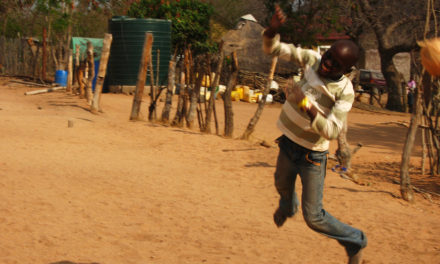“Mabiriviri! Mabiriviri! Kombela mabiriviri!” The kids continued to insist! “Chili peppers! Chili peppers! I’m asking for chili peppers!” Some kids do appreciate spicy foods (I think I was one of those kids), but if you’ve got a group of 5 or 10, some of them only 4 or 5 years old, do you really think they all want chili peppers? “Kombela mabiriviri!” in a big chorus. But they all persisted! “Ma rhandza mabiriviri?” – “You all like chili peppers?” I asked skeptically. “Ee!” they all agreed strongly.
 I took several of the older ones over to the part of my garden where I’ve got a long row and a large variety of different types of chili peppers, all the way from somewhat mild to very hot (habaneros, the hottest chili peppers in the world). Lora and I eat them all frequently, but we still have a surplus and I definitely don’t mind sharing an appreciation for chili peppers.
I took several of the older ones over to the part of my garden where I’ve got a long row and a large variety of different types of chili peppers, all the way from somewhat mild to very hot (habaneros, the hottest chili peppers in the world). Lora and I eat them all frequently, but we still have a surplus and I definitely don’t mind sharing an appreciation for chili peppers.
But I was skeptical of all these kids. “Bava ngopfu, kumbe bava leyi tsongo?” “Very spicy or a little spicy?” I asked. “Bava ngopfu!” – “Very spicy!” they all said in unison! I was very very skeptical. My habaneros are probably at least 100 times spicier than any other chili peppers available in the area. I decided to compromise with my skepticism and these kids’ insistence by giving them an “average” spicy chili pepper, but one that’s still at least as spicy or a bit spicier than the ones available locally.
“Mangaki?” – “How many?” I asked. “Ma ku tala!” – “A lot!” they all said. I eyed them up and down, they were all very eager and grinning widely. I decided to give them 5 each, just to see. They held them in their hands or put them in their pockets and went back over to playing marbles or soccer or with other toys there on our porch and in our yard. I went back inside and continued with whatever I was working on.
Later in the afternoon, after the kids had left, I went outside to put the toys back in the box. And there were chili peppers all over the ground, around the yard! Some were in fine condition and could still be used, others had been stepped on and crushed. They were obviously thrown carelessly around, at least 10 or 15 of them, probably all that I’d given away!
It really disappointed me. I do have a surplus of chili peppers, but I’ve spent a long time and a lot of hard work cultivating them. The soil here isn’t rich at all and water is hard to come by. The surplus could’ve been turned into hot sauce for later if/when the plants die. And I really love my chili peppers. I hate to see them wasted like that.
But the truth is, I definitely could’ve seen it coming. It’s actually fairly typical around here. Not asking for chili peppers, that’s not what’s typical, as most people don’t have any chili peppers to give away. But asking for something. Something that a person doesn’t particularly need, or doesn’t even really want, or maybe doesn’t even know what it is, but asking for it anyway.
Most all Peace Corps Volunteers in South Africa are very accustomed to people asking them for stuff. Walking through the local town, you might be stopped several times and asked for five rand (the largest coin here, worth almost $1). If you’re a woman, you’ll be asked for marriage at least a few times every time you go somewhere new. At home in your village, you might be asked for bread, cell phone airtime, a job, a cold drink, money to build someone’s house, more marriage proposals, a trip to America, a bag of chips, a car, a computer, or even chili peppers. Anything they can think of really.
Some of that makes sense and can be freely given: bread for hungry people (though are they really as hungry and short on money as often as they say they are?) or a drink to share. Though somehow the more you give, the more people seem to come and ask. Some of those things, of course, are out of our reach or unreasonable. And when people realize you have skills to share but not necessarily physical resources, they’ll ask you for those, which is fine, I mean, that’s what we’re here for.
But it can all get pretty old. Yeah, I can train you to use computers, or I can teach you to speak English, but do you really want to use computers or speak English? It takes a lot of work and a long time! Are you willing to practice? Yeah, we painted a world map on the wall of this school, with the help of Art Club students who’ve been training for over a year, but I’ve never met you and I have no idea where your school is nor whether the learners there know how to help, so how can I paint one there?
And yes, we helped this school arrange with a local donor to build a new room for a computer class and library to supplement the programs we’ve been working on here for almost two years. But no, we won’t do the same for you because you already have plenty of empty rooms at your school and no, money doesn’t grow on trees where we’re from in America just like it doesn’t grow on trees here in South Africa.
At this stage, I think you’re all probably agreeing with me whole-heartedly, agreeing with my frustration and disagreement that is. Of course the truth is, asking for stuff, especially asking for stuff you don’t really need or maybe even want, is VERY contrary to American (and generally Western) culture. It’s just not right. And it’s not just wrong practically; to us it’s morally wrong. Pretty much every example I’ve given so far is definably immoral, to us that is. But I think the reality is a lot more complicated than that.
Historically, most Africans have lived in an environment that’s been less than kind to them. Weather’s unpredictable, harvests couldn’t always be assured, and tribal allegiances changed frequently. Africans are tough, they survive, and they often do it through surviving mechanisms built into their culture. Asking for things, even when they weren’t needed, could be a way of saving up potential necessities for a time when they might very well be needed. And when they ask, they generally expect something to be given. Because giving things to a neighbor or community member can help store up social credit for a time when they also need to ask for things in return.
So all in all, it’s probably a survival tactic that’s seen them well enough through the centuries and millennia. Even with the arrival of colonizing Europeans, though many Africans had no idea what sort of technology they brought with them or what its use was, still a lot of it turned out to be beneficial, so why not ask? So the whole culture of asking for whatever might be given still exists today, even when the environment for many Africans has changed considerably.
Conversely for us Americans, and most Westerners, our history comes from a much more temperate climate and environment. We’ve had more freedom to create our own food storages, or experiment to increase crop productivity, even to specialize and create technologies which have made it even easier than ever before. For the most part, our future and especially our immediate future is secure; and we believe that each one of us individually can secure our own futures individually.
For Americans to ask too much for things, especially when not in dire need, is a shameful act, placing burden on others who are shouldering their own burdens as it is. Each person is expected to have developed their own independently secure future, and someone simply asking for something for nothing is obviously mal-adapted to our society and culture. Even when a person is actually in need, we have organizations and charities that they can go to so they don’t have to commit the shameful act of personally requesting something of another person.
But back to the culture in our area here in South Africa: even if we could ignore the obvious moral connotations, something that’s not easy as Americans, there’s still a lot of practical challenges. This situation here, of tending to ask for anything that can be given, makes development work very difficult. The thing is, with modern development work, you don’t really want to force or push something on people that they don’t want for themselves, because that’s obviously not “sustainable” and you’ll be pushing it for the rest of your life or it’ll just collapse. So you need to hear their ideas first, about where and how they want to develop, what kind of assistance they’re asking for, etc. The trouble is that here, people ask for everything.
Schools are asked to list areas of development or skills that they prioritize the most when requesting Peace Corps Volunteers. Out of a list of 50 or more options, every school still prioritizes everything with the highest rating. Even after being here for two years and our schools absolutely know that we have a limited set of skills and that the next Volunteer will also have a limited set of skills, they still have to be coached through the idea of picking the skills they want/need the most, and giving lower priorities (at least by 1 point) to the other things they desire less. They really feel like they need to ask for everything that can possibly be given to them.
On top of that, the ideas that people here have for their own development are nearly always based on someone else’s, regardless of whether or not the situations are the same. For example, if one school gets something new (like a small guard-house building next to the entrance gate, or covered parking for the teachers), then every school makes it their top priority to get one too.
Even if they’re short of classrooms, even if the budget could be better spent on office supplies or learners’ desks, their top priority becomes whatever’s most obvious that their school is lacking and another school has. So if they make a “wishlist” of whatever they want, they’ll put the guardroom or the covered parking or something realistically unnecessary on the top of the list. And even after you see that list, if you offer office supplies or learners’ desks, something you’ve noticed is a need but they haven’t prioritized, they’ll still say “yes, give it to us.”
And that’s true even if you’ve “noticed” wrongly. An outsider might see 5 kids crammed at one small classroom desk and assume the school is lacking an adequate number of desks. The school may realistically have 30 or 40 perfectly good desks locked in a storage room somewhere that’s not easy to notice. But if you offer them more desks, they’ll say, “yes, we need it.” And when the new ones arrive, they’ll probably get transferred to the storage room along with the rest of the surplus.
One great example of how this increases development difficulty is a recent water issue (and “solution”) that one of our schools had. They have a borehole (essentially a well made for a pipe and a pump) that often pumped only sporadically around September through November, the same time the rest of the wells in the village were getting low and drying out. The school always assumed they needed a bigger or better pump, especially since they couldn’t see down the hole to how much water might or might not be available down there.
An organization called “Water For All” was contacted for free assistance. Water For All determined that the borehole was simply of limited water capacity and subsequently installed a new pump of a more adequate size for the water capacity as well as a solar panel and a merry-go-round (for kids) that powered it; a great solution for the sometimes unreliable electricity of the school and village. And it was all completely free for the school.
 However, the water supply isn’t enough for all the school’s needs. Also, the new pump isn’t strong enough to pump the water half-way across the school yard to another water tank, unlike the old pump which ran off electricity and would pump across the yard just fine when there was plenty of water down below. The school felt disappointed by the results and asked for another pump that was stronger. Water For All said they installed the right pump for the water supply and couldn’t offer a bigger one.
However, the water supply isn’t enough for all the school’s needs. Also, the new pump isn’t strong enough to pump the water half-way across the school yard to another water tank, unlike the old pump which ran off electricity and would pump across the yard just fine when there was plenty of water down below. The school felt disappointed by the results and asked for another pump that was stronger. Water For All said they installed the right pump for the water supply and couldn’t offer a bigger one.
The school officials themselves told me they couldn’t ask Water For All to take the new pump back and re-install their old pump because the school had already requested Water For All’s help, no matter what kind of help it was. And in the end, they’re still happy to have more equipment and supplies, even if it’s not all working or can’t work the way they’d envisioned it. Essentially, they were willing to ask for, and receive, whatever it was that could be offered, even if they didn’t really believe it was good for them.
The problem is, I don’t think there’s any great solution to these situations. There’s no one-stop fix-all. I think in each situation, the person attempting to “help” needs to know as much about the situation as possible, as much about the people involved (and their true desires and motives) as possible, and needs to be creative (and often make their own judgment) about a way to get to the heart of it all.
For my own part, I’ve developed a system of dealing with the kids asking for chili peppers. I can’t really change their culture of asking for something they don’t really want, that’s practically impossible in a short time like this. So, I go through essentially the same process that I first described, but when I get to the point of giving them chili peppers, I first give them only one. I tell them they have to eat it right then and there in front of me so that I can see that they really like spicy chili peppers.
Usually the kids try to avoid eating it in front of me and say they’ll eat it at home and that I should give them more right away. Or some of the more practical ones change their mind and say they want the less spicy ones. But whatever they say they want to end up with, I don’t give them any more until I watch them eat one right in front of me.
It’s usually quite entertaining. Some kids will cough and spit it out right away, realizing they’ve lost and they won’t be getting any more. Others will try and try and try as hard as they can to keep a straight face, but you can see they’re squirming, they start breathing heavily, panting, sometimes eyes watering and then they give up. Even then, they’ll try to spit it out where I can’t see them and say they really like it and they want more!
As before, the goal for them is to ask for and receive whatever can be given to them, whether they really need it or want to use it or not, and many people will even go through great lengths and a decent amount of pain to get it. Usually, if a kid has kept a fairly spicy chili pepper in his mouth for a while and then still asks for more, I’ll send him away with a few of the milder ones. Maybe this kid will really eat them and enjoy them, or maybe he won’t, but he did work hard for it and he entertained me at the same time! 😉
Even still, I don’t think these explanations of their cultural background and our attempts to work within it as it is will satisfy most of you Americans and Westerners. It’s not all that satisfying to us either. When you grow up with the idea that asking for things, especially things you really don’t need, should have a certain amount of shame attached to it, then you encounter so many people and organizations asking shamelessly for so much stuff, stuff they often don’t need at all, it’s still tough to swallow.
But after thinking long and hard about it, I’ve come to the conclusion that people here might be onto something, with this system of asking for anything that might possibly be given. No, I can’t say I appreciate it, especially not when I know they’re asking for something they won’t use or don’t at all need. I still believe that overall resources are limited and that it’s better for everyone if the people who need or will best use or even just desire certain resources most are the ones who get them. But I think the overall philosophy behind asking for anything that might be given has something we Westerners can learn from.
Whereas we tend to think we’re individually responsible and that our futures are secure (and predictable) enough, I don’t think that’s entirely accurate. Even when we’re offered something, if we don’t think we desperately need it (and sometimes when we do), we tend to reject it in order to re-assert our own self-reliance. We sometimes even carry that idea into thinking that we’re “good enough on our own” and that what anyone else offers is not necessary to us.
That’s a major part of what I don’t think is accurate: I think we really aren’t good enough all on our own, but that we really and truly do need other people, and that other people often have something to offer to us that may be invaluable in the future, even if we can’t recognize it now. So a pre-emptive rejection based on the fear of becoming inter-dependant can actually hurt us more than we’d ever realize.
And I don’t think our futures are all that secure and predictable. Sometimes they really do fall right in line with our expectations. But isn’t life also filled to the brim with the unexpected? An African knows that asking and receiving what’s offered is one way of being prepared for life’s unexpected events and situations.
But what I’m really taking from this “asking for what might be given” idea is something even deeper, not so much related to physical resources. In our Christian churches, we tend to suggest caution when asking for things from God. We may say, “be careful when you ask for patience, because God will put you in a situation that requires you to have it!” Or even just as simple as, “be careful what you ask for, because you might get it!” Always worried about the side effects of asking for something more than we have now, especially in regards to character.
I’m not advocating some sort of “name it and claim it” where we ask God for every sort of luxurious desire we can think of; that’s a different discussion. But I do think we don’t need any reservations when we ask for something from God. We can’t see or know it all the way he can. Who are we to say what we do or don’t lack? What we will or won’t need in the future? Especially as it regards our personal character, that part of us that’s supposed to truly be in God’s image, what can we ask of him that we don’t truly need?
Instead, God holds all that we need, even the fulfillments of all our deepest desires, so why not freely ask now, trusting that what he gives will be good for us, no matter what it feels like or seems like during the process of receiving it. Maybe that damage to our own feelings of self-reliance, the belittling of our own ideas of self-secured and predicted futures, maybe that’s one of his greatest gifts to give, something given even through the process of us asking for what we need. So we should ask, shamelessly and without reservation.
“Ask, and it will be given to you; search, and you will find; knock, and the door will be opened for you. Everyone who asks receives, and everyone who searches finds, and for everyone who knocks, the door will be opened. Is there anyone among you who, if your child asks for bread, will give a stone? Or if a child asks for a fish, will give a snake? If you then, who are evil, know how to give good gifts to your children, how much more will your Father in heaven give good things to those who ask him!” (Matthew 7:7-11)
We have no idea what God really has in store for us. So we should freely and shamelessly ask him for everything he can give us. Jesus promises us, it will be good.





